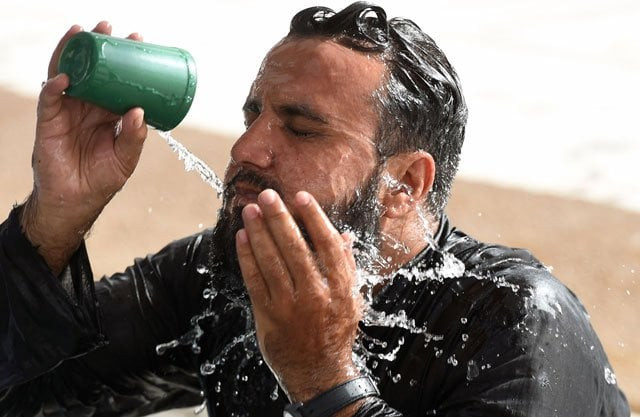Karachi remains parched as temperatures soar
Mega city gears for another season of water shortages this Ramazan

As the onset of sweltering summer coincides with the holy month of Ramazan, Karachi is once again faced with an intense water shortage that has left taps running dry in many low and middle-income neighbourhoods.
The port city’s recurring water crisis is owed not only to its burgeoning population but also to the lack of a mega water supply project that is merited for a city of its size. In addition to that, issues like misappropriation of water from canal systems before the Dhabeji Pumping Station, water theft by tanker mafias operating in the city, illegal siphoning by commercial centres, and wastage of water due to rotten pipelines have led to further aggravation of the crisis.
While parties in cahoots for these crimes continue to make bank year after another, it is the residents of the city, especially those belonging to lower-income neighbourhoods, who have been left to foot the bill of Karachi’s growing water shortage. When taps begin to puff out air, their only options are to either draw out contaminated groundwater or shell thousands of rupees to buy water tankers that have established a criminal monopoly over the city.
According to the details, the population of Karachi is expected to have climbed to over approximately 25 million, meriting at least 1,200 million gallons of water daily (MGD). However, the city only receives about 580 MGD, including a share from Hub Dam and the Indus River, leaving a deficit of over 620 MGD.
An official of the Karachi Water and Sewerage Board (KWSB), speaking on condition of anonymity, said that unfair distribution and crimes of the tanker mafia are the main reasons behind the port city’s water problems that, as opposed to popular belief, are not inherent. “Despite getting an unjust share, the little water that reaches the city is either wasted or stolen, which means that out of the 580MGD supply, the city only realistically receives 415 MGD of water, which is too less,” the officer informed.
On-ground surveys reveal that at present, areas including New Karachi, North Karachi, Orangi Town, Landhi, Malir, Korangi, Gulshan-e-Iqbal 13D2 and 13D3, Gulistan-e-Jauhar, Kharadar, Kemari, Shah Faisal Colony, Mahmoodabad, North Nazimabad, Nazimabad, Liaquatabad, Lines Area and PECHS are faced with severe shortfalls of water.
Read More: Met dept predicts four days of higher temperature for Karachi
The water board’s water supply distribution system is also in a state of disrepair. Leakages in water lines, malfunctions in valve operations, and irregularities in government hydrants are also causes of the water crisis in the aforementioned zones. “The city has six official water board hydrants located at Pepri, Landhi, Safora, Nipa, Sakhi Hassan, and Manghopir. These government hydrants run 24 hours a day, causing water shortages in the surrounding areas,” revealed an official of the water board. Per the concerned officer, in view of this dire situation, the duration of hydrants should be immediately fixed to six hours a day. “Despite the city’s unfair share of water, we can still remedy a lot of our crisis just by strictly and fairly implementing the water supply and distribution system,” he opined.
According to the unnamed water board official, these proposals have been made many times in the meeting of the Karachi water board, but the mafia infiltration in KWSB always manages to find a way to reject these motions.
Another KWSB spokesperson, who wished to remain unnamed, said that the administration had taken steps to resolve the water crisis during Ramazan on the instructions of Water Board Vice Chairman Najmi Alam. Per him, Alam has directed the concerned officers to ensure justifiable distribution of water supply. “The management of all mosques, especially the places of Taraweeh, are to be contacted and the water and sewerage problems are to be solved. Water tankers would be provided free of cost on the Deputy Commissioner’s quota in the places where there is a shortage of water in mosques and places of Taraweeh,” he told The Express Tribune.
Published in The Express Tribune, April 5th, 2022.



















COMMENTS
Comments are moderated and generally will be posted if they are on-topic and not abusive.
For more information, please see our Comments FAQ